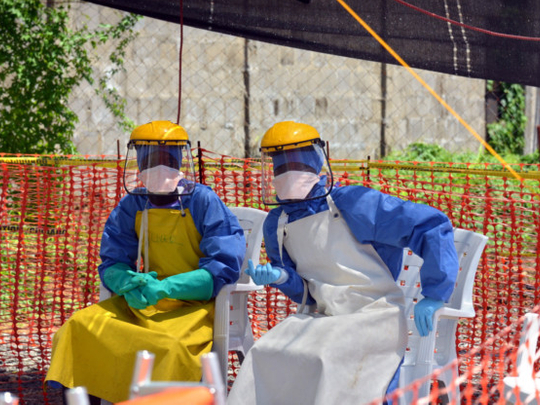
As the world has rightly focused on the response to the terrible outbreak of Ebola in West Africa, and the new cases in Europe and the US, another unrelated Ebola outbreak has taken place in the Equateur province of the Democratic Republic of Congo. It began in August in the village of Ikanamongo and, as with all other outbreaks, was triggered when the Ebola virus crossed the species barrier between animals and humans and infected one person before spreading to others.
It is thought that the first person to contract the virus in Ikanamongo was a woman, infected while butchering wild game to cook for a family meal. The outbreak caused around 70 infections and 43 deaths. But, unlike in West Africa, the last known case occurred around three weeks ago and the outbreak will likely soon be declared fully contained by the World Health Organisation.
In today’s globalised world, it is almost certain there will be more Ebola cases reaching Europe and the US — despite the airport screening programme launched this week in several countries. Given this, and the fact that current estimates predict the rate of infection will rise to 10,000 cases per week by December, it is vital that the lessons of how to defeat Ebola are learned quickly.
Once the DRC outbreak was reported to health officials in Kinshasa, the response was rapid — a team that had contained numerous outbreaks in the past was brought in. It was headed by Jean-Jacques Muyembe, a professor of microbiology and now director of the DRC National Institute of Biomedical Research, who was the first medic to arrive in Yambuku when the first known outbreak occurred in 1976.
His team has contained more than 10 outbreaks in the country and, with others in countries such as Uganda, has demonstrated that a rapid and robust response can stop rural outbreaks before they spread to major urban areas and across international borders. In fact, in 1995, the DRC team prevented a potential outbreak in Kinshasa, the capital city with a population of nine million, when a patient from an outbreak in Kikwit, five hours away by road, made his way to a hospital there.
It was at Kikwit that the three basic public health strategies to prevent Ebola outbreaks were tested and proven. They were: Rapid identification and isolation of those with the Ebola infection in controlled health facilities where workers are protected; tracing everyone who has been in contact with an infected person and monitoring their temperature for 21 days, with those who develop the Ebola fever isolated at a health facility; and helping local people understand how to protect themselves while providing safe patient transport and burial, and working with village chiefs and elders to help quell rumours about the origins of disease.
So what has gone wrong in the current tragic outbreak in West Africa? First, by the time the rural infection was reported it had spread to several communities and the initial response was not robust enough to contain it. Now, urban areas are affected, where community organisation is less structured and effective, and where trust in government is low because of recent civil conflict. At the same time, the health system has collapsed in several areas where health workers have been infected, making it a challenge to ensure patients are isolated from their families.
It is essential that as many lives as possible are saved while attempts to stop the outbreak are under way. New and innovative ways are already being found to compensate for the weakened public health systems in the three most affected countries. In Sierra Leone, people were confined to their homes for a three-day period. This was controversial: Would there be facilities to isolate patients who were identified; would there be burial teams to carry away the dead? But it was accomplished without the dire consequences predicted by many outside the country.
Other innovations might include modifying community care centres so they can be used for Ebola patients — especially important in providing diagnosis, treatment and isolation of patients whose numbers have surpassed available hospital beds.
Support from international partners is rapidly increasing in West Africa and this is essential for success, even though President Barack Obama declared this week that the world “is not doing enough” to combat the disease. But it is important to remember the lessons from Haiti after the 2010 earthquake. When a major cholera outbreak occurred, the international response was generous, but much of the coordination was ineffective, resulting in duplication of effort, while gaps in the essential response remained.
Despite the early lack of coordination in West Africa, and despite declarations that this outbreak is more difficult to contain because of poverty, recent civil disturbance and war, there is no time for excuses. With support from the United Nations, government efforts must be strengthened. The errors made in Haiti must not now recur in West Africa, where every day lives continue to be lost.
— Guardian News & Media Ltd
David Heymann is head of the Chatham House Centre on Global Health Security and professor of Infectious Disease Epidemiology a the London School of Hygiene and Tropical Medicine.












